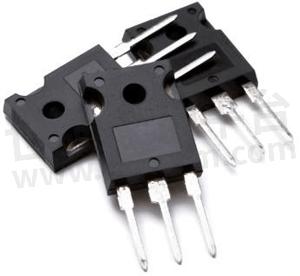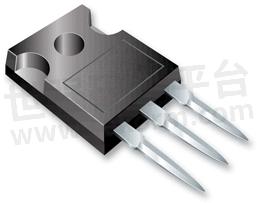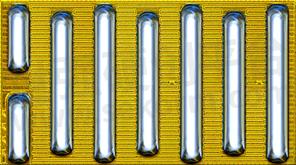A Brief History of Power Transistors for Engineers




In this article, we reflect on the history of semiconductors from the early days of Bipolar Transistors to the present advancements and promise of gallium nitride (GaN) FETs and ICs.
Overview of Semiconductors and Their Uses
Semiconductors play a crucial role in the modern world of electronics. Semiconductors are materials that have electrical conductivity between that of a conductor (such as copper or aluminum) and an insulator (such as rubber or glass). Some common semiconductors include silicon, silicon carbide, and gallium nitride.
Semiconductors include components such as transistors, diodes, and integrated circuits. Transistors are the basic building blocks of most modern electronic devices, including computers, smartphones, and televisions.
The Early History of Semiconductors: Pre-20th Century
The history of semiconductors dates to the late 19th century when scientists first began to study the electrical properties of materials. One of the key discoveries of this era was the observation that some materials could produce an electric current when exposed to light. This phenomenon was later called the photoelectric effect and paved the way for the development of solar cells.
Early semiconductors presented several challenges that needed to be overcome to develop practical and reliable semiconductor devices. Some of the main challenges included:
Material purity: To function properly, semiconductor materials must be extremely pure, with impurities measured in parts per billion. Achieving this level of purity was a major technical challenge in the early days of semiconductor development.
Fabrication techniques: The development of reliable techniques for fabricating semiconductor devices, such as doping and photolithography, was also a major challenge, as these techniques required precise control of materials and processes and the development of specialized equipment and manufacturing processes.
Heat dissipation: As semiconductor devices became more complex and powerful, they generated more heat, which could damage the device and affect its performance.
Size limitations: Early semiconductor devices were relatively large, which limited their practical applications. Developing techniques for creating smaller and more densely packed devices, such as integrated circuits, was a major breakthrough in semiconductor technology.
Overcoming these challenges required significant advances in materials science, manufacturing processes, and engineering.
The Development of the Bipolar Transistor
The predecessor to the ubiquitous modern-day transistor was the bipolar transistor. The bipolar transistor is a type of transistor that uses both electrons and holes to carry current. The bipolar transistor quickly replaced vacuum tubes as the primary component in electronic circuits, due to its smaller size, greater efficiency, and lower power consumption. It enabled the development of a wide range of electronic devices, such as radios, televisions, and computers, and paved the way for the development of more advanced semiconductor technologies, such as the integrated circuit.
Although the bipolar transistor represented a significant breakthrough in semiconductor technology, it also presented several challenges that needed to be overcome. Bipolar transistors are made of multiple layers of semiconductor material, which requires complex manufacturing processes and precise control of materials and processes. This made them difficult and expensive to produce in large quantities. Bipolar transistors are also relatively inefficient compared to other types of transistors, meaning they consume more power and generate more heat. Early bipolar transistors were relatively large which limited their practical applications, and they were prone to generating electrical noise, which can interfere with the proper functioning of electronic circuits.

Evolving to the Silicon power MOSFET
The evolution from the bipolar transistor to the silicon power MOSFET (Metal-Oxide-Semiconductor Field-Effect Transistor) began in the 1960s when engineers started to investigate alternative transistor designs that could address some of the challenges presented by bipolar transistors.
One of the main advantages of the MOSFET is its low power consumption, which makes it more efficient than bipolar transistors. MOSFETs are also relatively simple to manufacture and can be produced in large quantities at low cost. In the 1970s, engineers began to develop MOSFETs that were optimized for power applications, known as power MOSFETs. These devices were designed to handle high voltage and high current levels and were able to switch on and off rapidly, making them suitable for use in power electronics applications such as motor drives, power supplies, and inverters. Today, power MOSFETs are widely used in a range of power electronics applications, from consumer electronics to industrial and automotive systems.
As with the bipolar transistor, silicon power MOSFETs have reached the end of the road in delivering better performance at a consistently declining cost. Fortunately, the quest for the ideal switch that has infinitely fast switching speed, no electrical resistance, and a lower cost has not slowed, and new base semiconductor materials upon which to build high-performance power conversion transistors and integrated circuits have emerged.

The Recent History of Power Transistors to Present Day
The evolution from silicon power MOSFETs to gallium nitride (GaN) FETs began in the 1990s when researchers started to explore the potential of GaN as a semiconductor material for power electronics. GaN is a wide-bandgap material that offers several advantages over traditional semiconductor materials such as silicon, including higher breakdown voltages, higher operating temperatures, and faster switching speeds.
In the early 2000s, researchers developed the first GaN-based power transistors, which were initially used in niche applications. However, as the manufacturing processes for GaN transistors became more refined, their cost decreased, and their performance improved. This led to the development of GaN FETs that were optimized for power electronics applications.
How Gallium Nitride Solves Challenges of the Past
One of the main advantages of GaN FETs is their ability to switch on and off at much higher frequencies than silicon power MOSFETs, which enables the development of more efficient power electronics systems. GaN FETs also have lower switching losses than silicon power MOSFETs, which reduces the amount of heat generated during operation and improves overall efficiency. Another advantage of GaN FETs is their ability to handle high voltages, which makes them suitable for use in a range of high-power applications such as electric vehicles, renewable energy systems, and data centers.

The Future of Semiconductor Technology with Gallium Nitride at its Core
The future of semiconductors is promising, with ongoing research and development efforts focused on improving the performance, reliability, and cost-effectiveness of advanced semiconductor devices. Wide-bandgap semiconductors such as GaN, are paving the way for a range of new applications and technologies. The advantages that GaN offers can lead to significant improvements in efficiency and reduce energy waste in many applications. As GaN technology continues to mature it is expected to lead to significant cost reductions and continued improvements in device performance and reliability.
Find Your GaN Power Solution
After this brief history of semiconductors, we invite you to continue the quest for the ideal switch by exploring our family of GaN FETs and ICs. For design assistance try the growing array of design tools, models, and performance simulations in the GaN Power Bench or contact us directly.
- |
- +1 赞 0
- 收藏
- 评论 0
本文由成长的人生转载自EPC GaN Talk,原文标题为:A Brief History of Power Transistors for Engineers,本站所有转载文章系出于传递更多信息之目的,且明确注明来源,不希望被转载的媒体或个人可与我们联系,我们将立即进行删除处理。
相关研发服务和供应服务
相关推荐
Where Are TVS Transient Suppression Diodes Used
A TVS (Transient Voltage Suppressor) diode is specifically designed to protect electronic circuits from transient overvoltages, such as surge currents and electrostatic discharges. It can quickly respond to voltage spikes, limiting overvoltage and protecting downstream circuit components from damage.
AC-DC Converter Module: Efficient Power Conversion Solution
The primary function of the AC-DC converter module is to convert the high voltage and high frequency AC power supply into a stable and low voltage DC power. This module is composed of various electronic components, such as diodes, capacitors, inductors, transformers, and transistors. These components work together to regulate the voltage and current of the output DC power, which is critical for the proper functioning of electronic devices.
Why Is It Important to Prioritize Electromagnetic Compatibility (EMC) in Circuit Design?
We live in a world full of various electronic devices, from smartphones, and computers to televisions and household appliances, which constantly emit and receive electronic signals. However, when these devices work, they generate electromagnetic fields that may affect the normal operation of other devices. This leads to an important concept that we must pay attention to when designing circuits - electromagnetic compatibility (EMC). Imagine in an ordinary home environment, your phone is charging while your TV is playing programs.
GaN Transistor for Several Power Applications
GaN transistors are significantly faster and smaller than silicon MOSFETs. The performance of GaN shows that efficiency and performance have improved significantly, leading to several new applications that were not possible with silicon technology. eGaN® FETs, from EPC, are supplied in a low inductance, low resistance, small and low-cost LGA or BGA packages. In addition, they offer designers the best in class compared to MOSFETs in both hard switching and soft-switching applications.
Intellectual Power Amplifier Module Based on GaN FETs
To simplify and accelerate the development process of many devices (D-class audio amplifiers, AC current and voltage calibrators, power supply modulators etc.), the idea of creating an Intellectual Power Amplifier Module (IPAM) appeared. IPAM is a fully differential pulsing power amplifier covered by a common negative feedback. The module contains small FPGA chip. The development of the output choke has turned into a separate R&D work related to the need to study the parameters of the newest high-frequency power ferrites manufactured by TDK/Epcos and Ferroxcube.
Use the Superior Power Density of Gallium Nitride FETs to Design a USB PD3.1 Power Supply with a 240 W, Universal AC Input
EPC‘s EPC9171 is a demonstration board. It features a low stage count approach for a universal AC voltage Input to 15V through 48V DC output with a load current limit of 5A suitable for USB PD3.1 power supplies.
TVS Diodes for Almost All Kind of Applications - High Performance Protection for Green and Sustainable Technologies
To design sustainable or “green“ technologies means also to ensure longest possible lifetimes of electronic devices, once they are produced. An important item is here the protection against transient voltage peaks, as they occur on the power grid in case of lightning strikes. Transient Voltage Suppressors (TVS) prevent high voltage surges from damaging sensitive electronic circuits. Diotec offers TVS Diodes for almost all kind of applications, and from low up to very high voltage levels. Check out our latest Application Note to find the optimal TVS solution for your project.
How to Design a 2kW 48V/12V Bi-Directional Power Module with GaN FETs for 48V Mild Hybrid Electric Vehicles
This artical tells how to Design a 2kW 48V/12V Bi-Directional Power Module with GaN FETs for 48V Mild Hybrid Electric Vehicles. A new reference design demo board, EPC EPC9165, is available to help jump start the design of a 2 kW bi-directional converter.
EPC and Analog Devices Collaborate to Deliver up to 2MHz Switching Frequency for the Highest Density DC-DC Converters Using GaN FETs
EPC and Analog Devices introduce reference design using a new Analog controller fully optimized to drive EPC GaN FETs.
SMBJ5349B Zener Diode Provides Effective Lightning Protection for Electronic Devices through Its Fast Response Characteristics and Ability to Absorb Over-Voltage
In today‘s electronic device market, Zener diodes play an indispensable role as key components for circuit protection. Among them, the SMBJ5349B stands out for its exceptional performance and stability. This article will provide a detailed overview of the SMBJ5349B‘s specifications and its advantages in practical applications.
The EPC9173 GaN IC Allows Designers of EBikes and Drones to Simplifying Design for Faster Time-To-Market
The EPC9173 tool allows designers of eBikes and drones to enhance motor system size, performance, range, precision, and torque, all while simplifying design for faster time-to-market. The EPC23101 GaN IC featured in this design has exceptionally high electron mobility and a low-temperature coefficient.
EPC GaN FETs Deliver Benchmark Power Density and Efficiency for DC/DC Conversion
EPC announces the availability of several reference designs that feature EPC GaN FETs and ADI controllers. The demonstration boards include EPC9158, EPC9160, and EPC9195. EPC GaN FETs leverage drivers and controllers by Analog Devices to simplify GaN design, increase efficiency, reduce cooling cost, and help enable the highest power density for computing, industrial, and consumer DC/DC converters.
MMBZ5242B Zener Diode with Outstanding Voltage Regulation Performance, Providing Stable and Reliable Voltage Support for A Wide Range Of Electronic Devices
In the realm of electronics, Zener diodes play a crucial role and are widely used in various circuits to ensure stable voltage output. Today, we will take an in-depth look at a prominent Zener diode—the MMBZ5242B—exploring its technical features and parameters.
电子商城
品牌:安邦
品类:Transient Voltage Suppressors Diodes
价格:¥0.8934
现货: 1,182,050
现货市场












































































































































































































登录 | 立即注册
提交评论